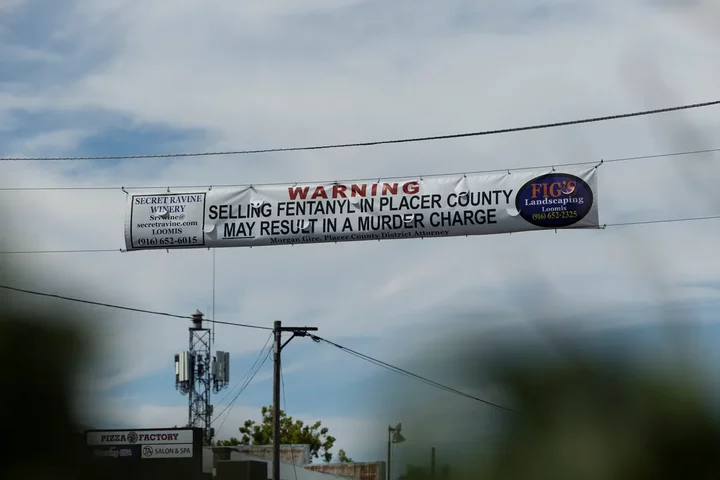A sign warning against selling fentanyl in Placer County hangs over Taylor Road in Loomis on July 24, 2023. Photo by Miguel Gutierrez Jr., CalMatters
People convicted of distributing fentanyl will face stiffer criminal penalties in the coming year under a new law shaped by rising overdose deaths.
The law increases the penalty for selling or distributing more than one kilogram of fentanyl by an automatic addition of three years to the original sentence.
The penalties continue to increase with weight, topping out at an additional 25 years for trafficking in weights exceeding 80 kilograms. Addiction experts warn the law could have deadly consequences if the “threat of police involvement and harsh prison sentences” makes someone reluctant to help an overdose victim by calling emergency responders.
The bill passed the Senate unanimously in September. Gov. Gavin Newsom signed it in October, along with several treatment-focused fentanyl bills.
Fentanyl is a synthetic opioid that can be fatal in small doses when taken on its own. Heroin and cocaine dealers have also sometimes laced products with fentanyl – which is cheaper than either drug – leading to accidental overdoses by people who unwittingly ingest it. Now, fentanyl is the most common drug causing fatal overdoses in California.
Tehama County District Attorney Matt Rogers told Redding television station KRCR-TV that the bill “will give us a better deterrent factor for those who are thinking about trafficking and fentanyl.”
“My hope is that it would deter people from selling fentanyl, that it would keep it out of our community – out of every community, but especially ours,” Rogers said. “It would keep it off the highways and off the streets, and we would see a reduction in fentanyl cases, as well as fentanyl overdose deaths.”
The bill, authored by Assemblymember Carlos Villapudua, a Stockton Democrat, moved through the Legislature even though other efforts to increase criminal penalties for fentanyl failed.
“If there are not consequences, there will be repeat supply available,” Assemblymember Jim Patterson, a Fresno Republican and author of one of the rejected bills, said after an April hearing on fentanyl bills in the Legislature.
Law enforcement groups, including the California Association of Highway Patrolmen, generally supported the new law. They said increased penalties will deter traffickers.
Those who opposed the bill, including the California Public Defenders Association, said increasing penalties does little to deter people from using or selling drugs, including fentanyl.
“Relying on ever increasing penalties for drug offenses has been extensively researched, and we can therefore make some educated predictions about the outcome of bills like AB 701,” the public defenders association wrote in opposition to the bill.
“It would not reduce the distribution of fentanyl nor would it prevent overdoses; it would reduce neither the supply of drugs or the demand for them; and worse, it could actually discourage effective methods of dealing with the opioid crisis.”
The public defenders association went on to say that the distinction between users and low-level dealers is too blurred to make a difference – they argue that most small dealers are also users, and sell drugs to support their addiction.
The bill goes into effect on Jan. 1.
###
CalMatters.org is a nonprofit, nonpartisan media venture explaining California policies and politics.

CLICK TO MANAGE